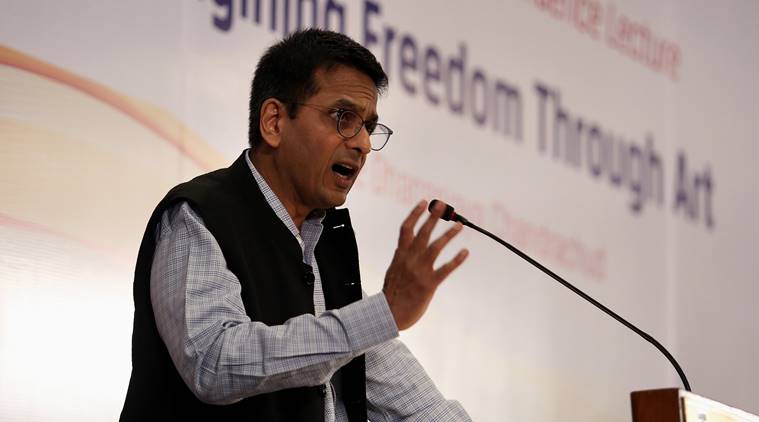Stay updated with the latest - Click here to follow us on Instagram
Transfer of judges no solution for complaints against them: Justice DY Chandrachud
The comments come days after former Madras High Court Chief Justice V K Tahilramani, in an unprecedented move, resigned after the Supreme Court collegium transferred her to Meghalaya HC “in the interest of better administration of justice”.
 Cautioning against personal attacks on judges over their decisions, Justice Chandrachud said: “You need to trust your judges.” (File/Express photo by Prashant Nadkar)
Cautioning against personal attacks on judges over their decisions, Justice Chandrachud said: “You need to trust your judges.” (File/Express photo by Prashant Nadkar)
Transfer of judges is no solution for complaints against them, Supreme Court judge D Y Chandrachud said on Tuesday. “There is nothing between impeachment and transfer. We need a system that is more nuanced than what we currently have to make judges accountable,” Justice Chandrachud said.
The comments come days after former Madras High Court Chief Justice V K Tahilramani, in an unprecedented move, resigned after the Supreme Court collegium transferred her to Meghalaya HC “in the interest of better administration of justice”.
Speaking at the launch of the book ‘How to Save a Constitutional Democracy’ by Tom Ginsburg, professor of Political Science at the University of Chicago, Justice Chandrachud said, “Independence of judiciary is not a concept to insulate it from accountability and rules of ethical behaviour but to protect it from wanton attacks against its institutional independence.”
Cautioning against personal attacks on judges over their decisions, he said: “You need to trust your judges. We do need a more balanced process but the final outcome of that process cannot be questioned.”
Senior advocate Aravind Datar, who also spoke during the discussion, said the judiciary is the bulwark of freedom and independence in the country. “In my experience, it is the judiciary that will save constitutional democracy,” he said.
Justice Tahilramani transfer: For Collegium, ‘her short working hours’ was key reason
Datar cited the example of the United Kingdom Supreme Court’s verdict that declared British Prime Minister Boris Johnson’s decision to suspend Parliament as unlawful.
On threats to India’s constitutional democracy, Justice Chandrachud said, “The debate around federalism has progressively sharpened. Democratic erosion does not take place in one sweep but happens slowly. Small instances, when left unguarded, pose a threat to constitutional democracy. Judges have to look at how these small aspects are implemented.”
On the problem of a large number of vacant posts of judges in higher judiciary, Justice Chandrachud said conventional methods are no longer adequate to deal with slow appointments. “I see no reason to not appoint ad hoc judges in high courts with large vacancies. Even the Supreme Court had three ad hoc judges when the Kesavananda Bharati case was being heard to take care of day-to-day work of the court since 13 judges were hearing that case for months,” he said.
He spoke in favour of increasing retirement age of HC judges and said the present retirement age, 62, is “very young”, when they are “at the peak of their mental abilities”. “If you are good enough to serve as a Supreme Court judge till 65, why are you only good enough to serve as a judge of a high court till 62 years,” he asked.







